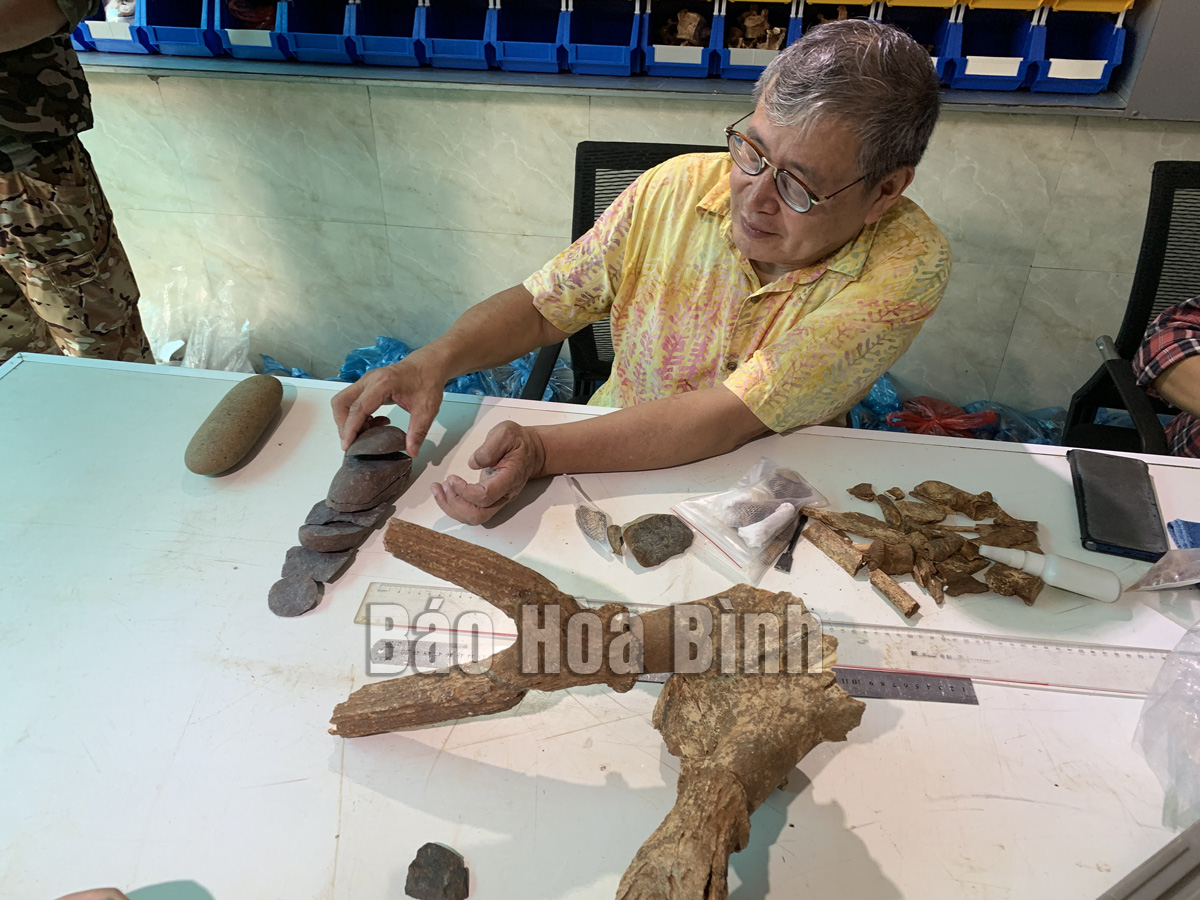
(HBO) – The Museum of Hoa Binh province has coordinated with the Centre for Southeast Asian Prehistoric Studies and the Vietnam Institute of Archaeology to excavate the Trai Hamlet cave and the Vanh Village stone shelter in Lac Son district, which are national archaeological relic sites and also home to diverse and outstanding items dating back to the Hoa Binh Civilisation.
Dr. Nguyen Viet, Director of the Centre for Southeast Asian Prehistoric Studies, introduces the items collected during the recent excavation of two archaeological sites in Lac Son district.
The excavation aimed to collect more scientific data about the Hoa Binh Civilisation in the province, gain an insight into the local history and culture, and serve display at the Provincial Museum.
The activity covered 50sq.m. at the Vanh Village stone shelter and 20sq.m. at the Trai Hamlet cave, collecting a number of stone and bone tools and burned rice grains.
Luu Huy Linh, Deputy Director of the provincial Department of Culture, Sports and Tourism, said the items have been sent to the Centre for Southeast Asian Prehistoric Studies for examining their age and value. Given the sites’ values, the department will propose the provincial People’s Committee work to seek the recognition of these places as special national relic sites and devise more measures for preserving and bringing into play their values.
The Trai Hamlet cave in Tan Lap commune was where the oldest vestiges of the Hoa Binh Civilisation in the Red River Delta were found. Discovered in 1975, this site has been excavated for many times by scientists. More than 5,000 objects have been collected since then, indicating that this was a long-term place of residence and also a tool making workshop of humans in the Hoa Binh Civilisation. So far, it is home to the most diverse stone and bone tools among the excavated relic sites of this civilisation. The cave could be classified as a site dating back to the early period of the New Stone Age.
Meanwhile, the Vanh Village stone shelter in Yen Phu commune was discovered by M. Colani in 1929. Research findings revealed by the French archaeologist in 1930 showed that this place dates back 17,000 - 18,000 years ago, which was the middle period of the Hoa Binh Civilisation.
Dr. Nguyen Viet, Director of the Centre for Southeast Asian Prehistoric Studies, said with the large number of tools, evidence of humans’ long-term residence, and the first fine art traces found in Vietnam, the Trai Hamlet cave and Vanh Village stone shelter could be recognised as special relic sites. All the items collected from these places will be handed over to and preserved at the Hoa Binh Provincial Museum to serve research and exhibition purposes to bring into play their values and meet the public’s demand./.
The People’s Committee of Lac Son district held a ceremony on April 28 to receive the provincial relic certificate for the ancient rock carving site at Suoi Co stream, located in My Thanh commune.
A special music show titled "The country is in the fullness of joy” has been held at Hoa Binh Square in Hoa Binh city in celebration of the 50th anniversary of the liberation of the South and national reunification (April 30, 1975–2025).
The People's Committee of Lo Son commune, Tan Lac district, has organised the local annual traditional stream fishing festival on April 19 - 20.
As a land deeply intertwined with human history and Vietnam’s millennia-long journey of nation-building and defence, Hoa Binh is often revered for its epic tales and legends.
Residents of Hoa Binh boast a rich cultural identity, reflected in their unique language, traditional attire, customs, and folk melodies – described as "sweet as honey, clear as a mountain stream.”
Lac Son district’s Vu ban town held the 2025 Truong Kha temple festival on April 12–13 (the 15th–16th days of the third lunar month). Since its revival in 2019, the festival has been organised every three years, preserving valuable intangible heritage while meeting the community’s cultural and spiritual needs.



